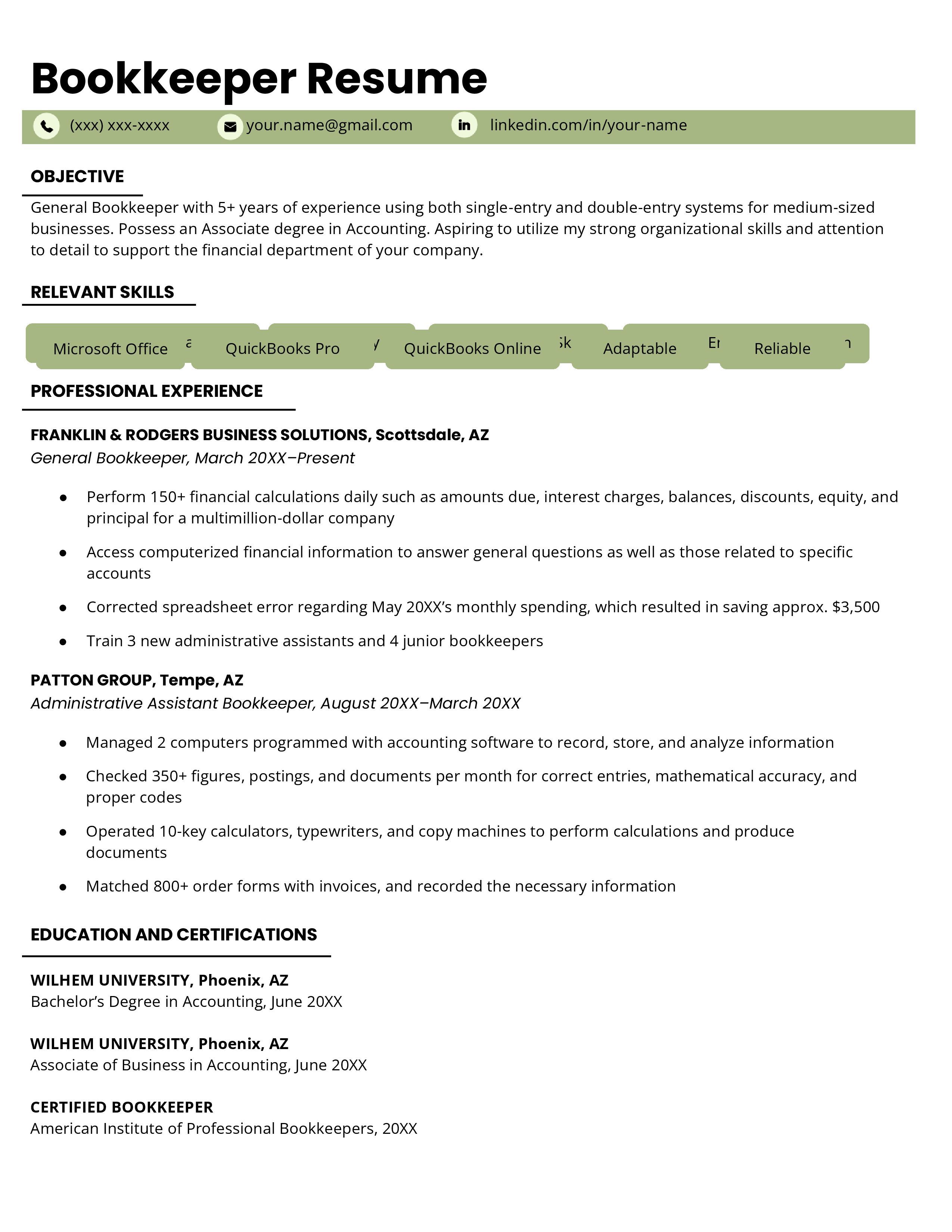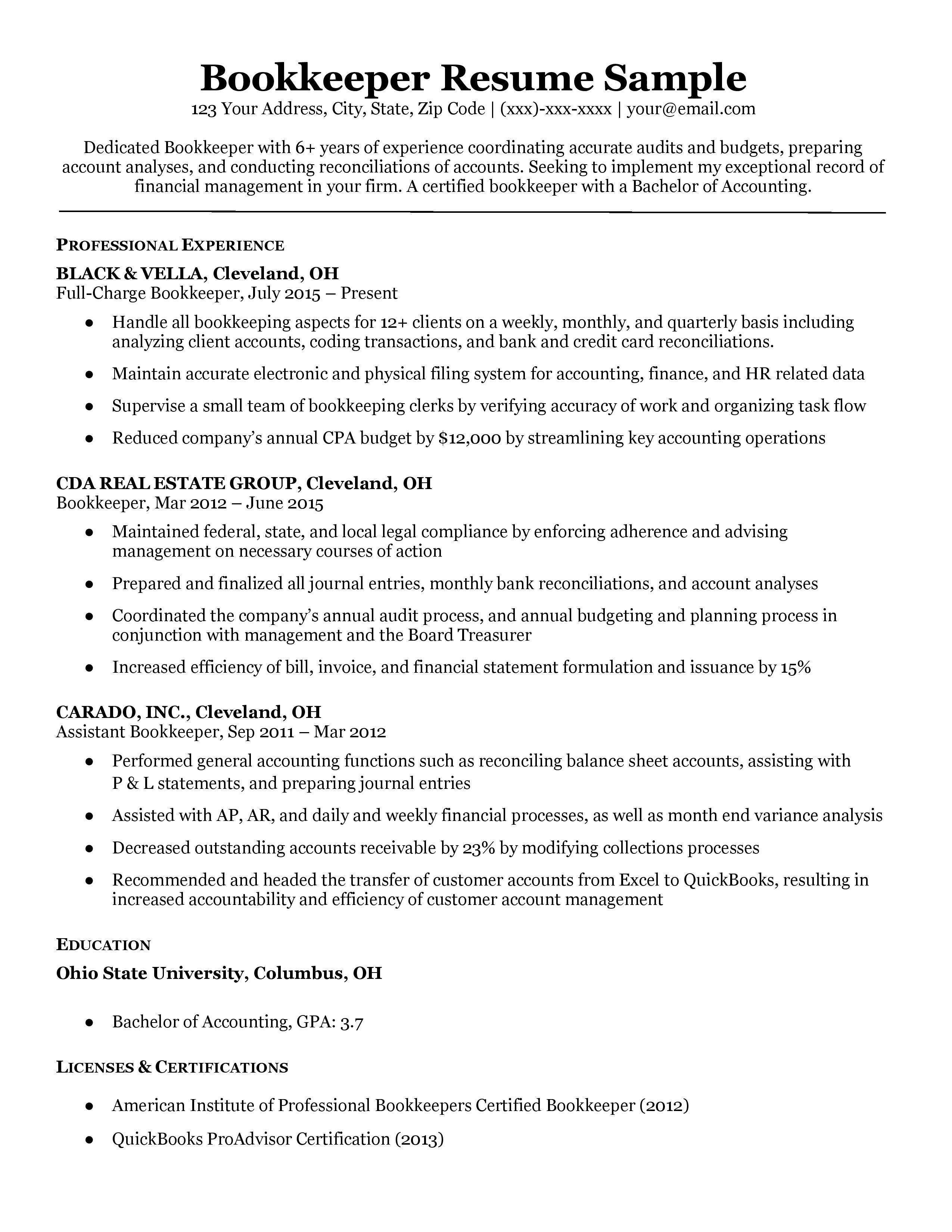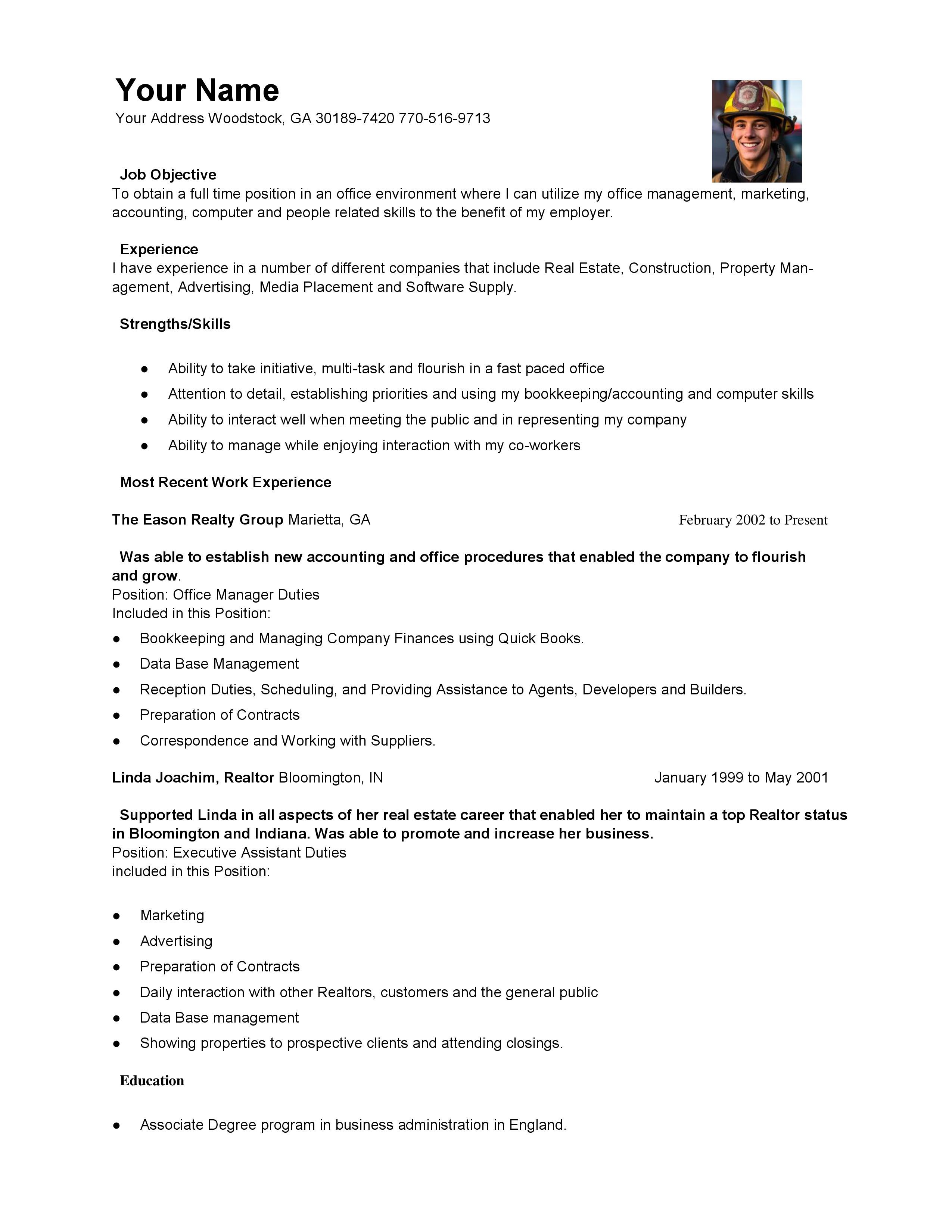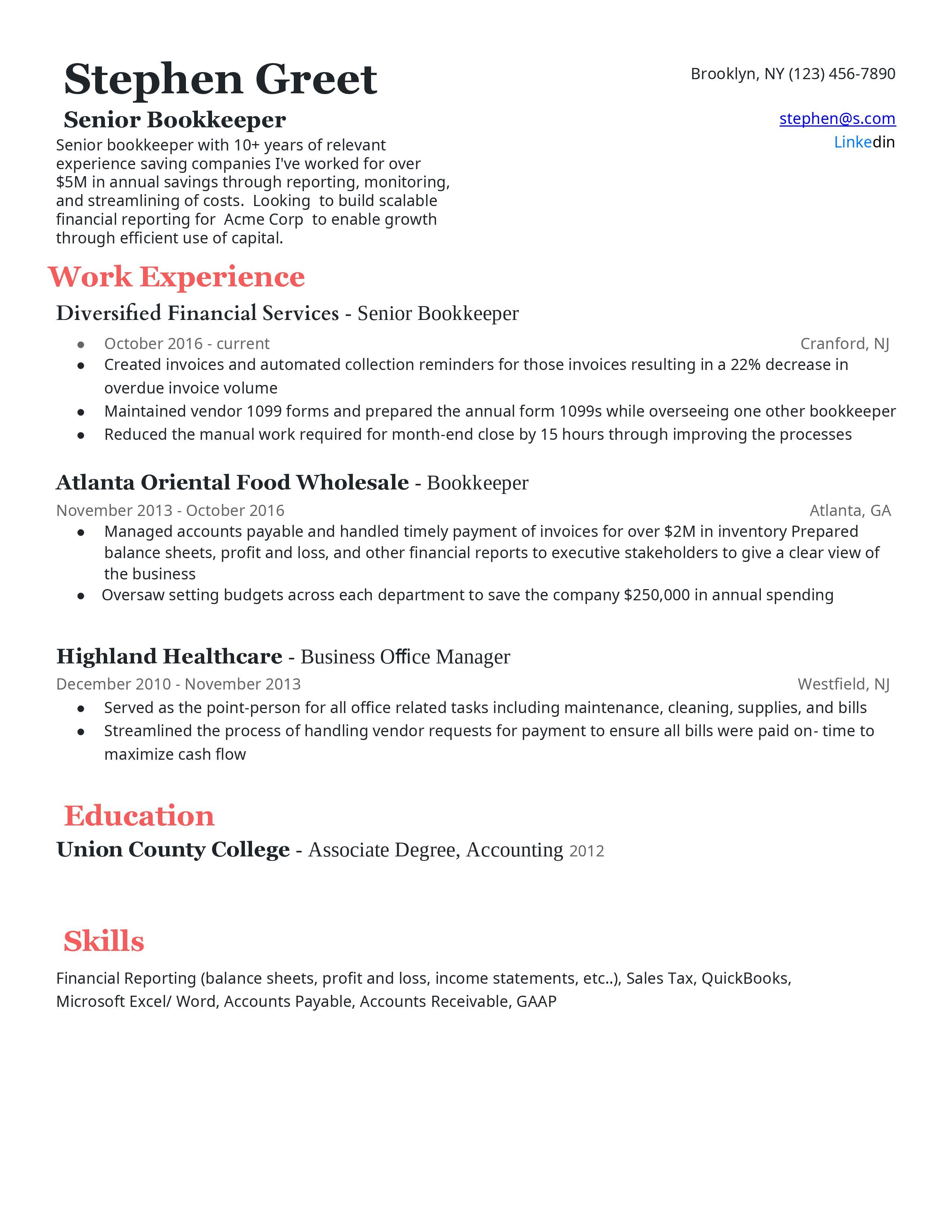Bookkeeper Resume Tips & Examples for 2025
Published on October 7th, 2024
In today's fast-paced, ever-changing environment, the accuracy of financial data, record maintenance, and day-to-day management of one's financial activities largely rest on the bookkeepers' shoulders. Of course, if it's your first job as a bookkeeper or an experienced bookkeeper, the right resume will separate you from the pack. This guide will take you through how to create a standout bookkeeper resume that showcases skills, experience, and value to potential employers.
What Is the Role of a Bookkeeper?
Before working out all the aspects of creating a resume for you, one must know what a bookkeeper is and what an employer is looking for. A bookkeeper records, classifies, and reports financial transactions, manages ledgers, reconciles bank statements, and produces financial reports. It also encompasses tasks such as invoicing, payroll, and tax preparation. This position requires good attention to
detail, good organizational skills, and competency in accounting software.
Check out the free resume templates for bookkeeper resumes -
Template 1
Template 2
Template 3
Template 4
The Body of a Bookkeeper Resume
What you write is only important if you structure it well. Here's a skeleton of the essential parts that must be included in your resume.
a) Contact Information
This should head your resume with clarity and up-to-date contact details. It includes:
- Full name
- Phone number
- Email address
- LinkedIn profile or portfolio (if available)
- Physical address (optional)
b) Professional Summary
The professional summary is that paragraph on the front page of your resume which shows to the recruiter what you have and where you can take them. It is the elevator pitch.
Try to put in it 2-3 sentences that best present your relevant experience, as well as skills, toward the job description. Remember to make that section individually tailored to their requirements toward that job description by underlining your strengths as a bookkeeper.
Example:
"Detail-focused and well-organized bookkeeper with over 5 years of experience managing accounts payable, accounts receivable, and payroll for small to mid-sized businesses. Proficient in QuickBooks and Excel, I have an excellent track record of meticulous financial recordkeeping and efficient accounting processes. Seeking to leverage my experience in a dynamic financial environment."
c) Key Skills
A "Skills" section is essential to show employers how rapidly you encompass the spectrum of abilities required for the position. Create a bulleted list, which highlights hard skills-accounting software and bookkeeping procedures-but also includes some of the soft skills, like communication and problem-solving.
Some examples of fundamental bookkeeper skills:
QuickBooks, Xero, and FreshBooks experience
Payable and accounts receivable maintenance
Reconciliation of bank
Payroll preparation
Tax preparation
Preparation of financial statements
General ledger maintenance
Attention to detail
Time management and organization
Work Experience
The work experience part of your resume is the heart. This is where you showcase your capabilities for doing bookkeeping work. Your work history should be in reverse chronological order: start with the latest job you have had. For each job mention the job title Company name Location Work period.
Use bullet points to give specifics about your job, which include responsibilities and accomplishments within a specific position, including details of achievements where possible. For example, instead of saying you "managed accounts payable," you might say, "Improved procedures reduced accounts payable processing time by 20 percent."
Bookkeeper
ABC Accounting Firm
New York, NY | March 2019 – Current
Kept all financial records for 15 small business clients: accuracy in accounts payable and receivable, payroll, and tax preparation.
Balanced bank statements and general ledgers in the first year to cut discrepancies by 30%.
Generated proper financial reports for individualized clients where which made cash flow and budgeting improved.
Implementation of cloud-based bookkeeping increased efficiency by 25%.
Education
Most bookkeeper positions require at least a high school diploma or its equivalent although many employers prefer the applicants with an accounting or related degree. Even if you don't have a degree in accounting, include your educational background on the resume.
If you have completed any relevant certifications or courses, especially becoming a certified bookkeeper or completing a course in accounting software those are here as well.
Example:
Bachelor of Science in Accounting | XYZ University | 2016-2020
- Graduated with Honors
- Relevant Coursework: Financial Accounting, Managerial Accounting, Payroll Accounting
Certifications & Training
A certification will set you apart from others as it reflects your willingness to learn and adapt to the latest evolutions in bookkeeping. Some of the most prevalent certifications include:
- Certified Bookkeeper (CB) by the American Institute of Professional Bookkeepers
- QuickBooks Certified User - qualifications to work with QuickBooks
- Xero Advisor Certification - skills to use Xero
- Write down the name of the qualification. Mention the Awarding body and when you have been awarded it.
Optional Sections
Add any other qualifications, e.g. volunteering, other languages you are fluent in, etc. or even professional memberships you may have. Just make sure the information is relevant to the job you are applying for.
Bookkeeper Resume Guidelines
With this knowledge of sections, here are the tips that will guide you in writing an elegant and professional resume:
Tailor your resume to the job
Tailor your resume to the position you are applying for. Read the job description carefully and tailor your resume to bring to prominence the skills and experiences most closely related to the position. This demonstrates to the employer that you have taken time to consider what they require and how you can fit their needs.
Action Verbs, and Quantifiable Achievements
Describe work experience as follows: Start each bullet point with a strong action verb like "managed," "streamlined," "improved," or "reconciled." Wherever possible, quantify your achievements with numbers to show the impact you made in previous roles. For example, define how many clients you handled or the percentage by which you reduced errors or saved time.
Emphasis on Relevant Skills
In the process of finding bookkeepers, employers also seek experience in accounting software and tools. Don't stop mentioning your experience with programs like QuickBooks, Xero, FreshBooks, or even Excel. Having experience with tax preparation software can be a good asset too. Those soft skills, such as being detail-oriented, a good communicator, and a good time manager, are just as valuable and should not go unmentioned.
Try to keep it short and easy to read
A resume should be concise and easy to read. Bullet points, headers, and white space work well for calling the hiring manager's attention to quickly scan your credentials. Avoid long paragraphs and keep each section short in length. One page should be the goal, but two pages are acceptable if you have a lot of experience.
Thoroughly proofread
Typos and grammatical errors can do nothing but derail an otherwise excellent resume in no time. A bookkeeper needs to be detail-oriented, so sending a resume replete with mistakes can often be a sign of the same lack of attention to detail. Have you proofread your resume before sending it out, or are you going to ask a friend or colleague to have a look at it?
Avoid Common Mistakes
While writing your bookkeeper resume, avoid these common mistakes:
- Incorporating irrelevant information: Focus only on relevant skills and experience in bookkeeping.
- Using ambiguous descriptions: Clarify the duties and accomplishments. Avoid writing statements like "Maintained books of accounts."
- Overuse of technical words: Even though you want to show your proficiency, refrain from overloading the resume with words about your technical capabilities.
- Lack of demonstration of soft skills: As much as a bookkeeper requires hard skills, soft skills like communication and problem-solving should be demonstrated.
Conclusion
A well-crafted bookkeeper resume is your golden ticket into the hotly contested field. Using this guide, you will create a resume that shows off your skills, experience, and qualifications in such a way that wins over hiring managers. Make your resume stand out by tailoring it to each job, emphasize it with quantifiable achievements, and be professional but concise.
Authors

Yash Chaudhari
With a strong background as an SEO and Content Specialist, Yash excels in driving organic traffic, improving search engine rankings, and creating SEO-optimized content. He has a proven track record of implementing strategies that increase website traffic and conversions. Additionally, Yash is an automotive enthusiast and has a keen interest in astronomy.
Hire the best without stress
Ask us how
Never Miss The Updates
We cover all recruitment, talent analytics, L&D, DEI, pre-employment, candidate screening, and hiring tools. Join our force & subscribe now!
Stay On Top Of Everything In HR





